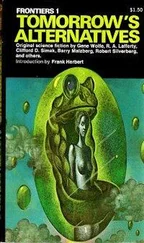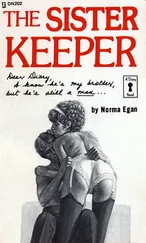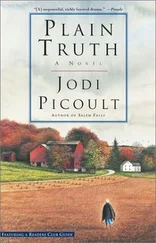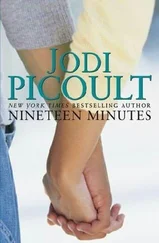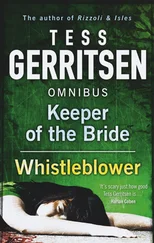"What's that?" Brian asks.
"Normally, with myelogenous leukemias, as long as the organs hold up, you can potentially reinduce the patient into remission every time there's a relapse. You're exhausting their body, but you know it will respond to treatment over and over. However, with APL, once you've offered a given therapy, you usually can't rely upon it again. And to date, there's only so much we can do."
"Are you saying," Brian swallows. "Are you saying she's going to die?"
"I'm saying there are no guarantees."
"So what do you do?"
A different nurse answers. "Kate will start a week of chemotherapy, in the hopes that we can kill off the diseased cells and put her into remission. She'll most likely have nausea and vomiting, which we'll try to keep to a minimum with antiemetics. She'll lose her hair."
At this, a tiny cry escapes from me. This is such a small thing, and yet it's the banner that will let others know what's wrong with Kate. Only six months ago, she had her first haircut; the gold ringlets curled like coins on the floor of the SuperCuts.
"She may develop diarrhea. There's a very good chance that, with her own immune system laid low, she will get an infection that will require hospitalization. Chemo may cause developmental delays, as well. She'll have a course of consolidation chemotherapy about two weeks after that, and then a few courses of maintenance therapy. The exact number will depend on the results we get from periodic bone marrow aspirations."
"Then what?" Brian asks.
"Then we watch her," Dr. Chance replies. "With APL, you'll want to be vigilant for signs of relapse. She'll have to come into the ER if she has any hemorrhaging, fever, cough, or infection. And as far as further treatment, she'll have some options. The idea is to get Kate's body producing healthy bone marrow. In the unlikely event that we achieve molecular remission with chemo, we can retrieve Kate's own cells and reinstill them-an autologous harvest. If she relapses, we may try to transplant someone else's marrow into Kate to produce blood cells. Does Kate have any siblings?"
"A brother," I say A thought dawns, a horrible one. "Could he have this, too?"
"It's very unlikely. But he may wind up being a match allogeneic transplant. If not, we'll put Kate on the national registry for MUD—a matched, unrelated donor. However, getting a Transplant from a stranger who's a match is much more dangerous than getting one from a relative-the risk of mortality greatly increases."
The information is endless, a series of darts thrown so fast I cannot feel them sting anymore. We are told: Do not think; just give your child up to us, because otherwise she's going to die. For every answer they give us, we have another question.
Will her hair grow back?
Will she ever go to school?
Can she play with friends?
Did this happen because of where we live?
Did this happen because of who we are?
"What will it be like," I hear myself ask, "if she dies?"
Dr. Chance looks at me. "It depends on what she succumbs to," he explains. "If it's infection, she'll be in respiratory distress and on a ventilator. If it's hemorrhage, she'll bleed out after losing consciousness. If it's organ failure, the characteristics will vary depending on the system in distress. Often there's a combination of all of these."
"Will she know what's happening," I ask, when what I really mean is, How will I survive this?
"Mrs. Fitzgerald," he says, as if he has heard my unspoken question, "of the twenty children here today, ten will be dead in a few years. I don't know which group Kate will be in."
To save Kate's life, part of her has to die. That's the purpose of chemotherapy—to wipe out all the leukemic cells. To this end, a central line has been placed beneath Kate's collarbone, a three-pronged port that will be the entry point for multiple medication administrations, IV fluids, and blood draws. I look at the tubes sprouting from her thin chest and think of science fiction movies.
She has already had a baseline EKG, to make sure her heart can withstand chemo. She's had dexamethasone ophthalmic drops, because one of the drugs causes conjunctivitis. She's had blood drawn from her central line, to test for renal and liver function.
The nurse hangs the infusion bags on the IV pole and smoothes Kate's hair. "Will she feel it?" I ask.
"Nope. Hey, Kate, look here." She points to the bag of Daunorubicin, covered with a dark bag to protect it from light. Spotting it are brightly colored stickers she's helped Kate make while we were waiting. I saw one teenager with a Post-it note on his: Jesus saves. Chemo scores.
This is what starts coursing through her veins: the Daunorubicin, 50 mg in 25 ccs of D5W; Cytarabine, 46 mg in a D5W infusion, a continuous twenty-four-hour IV; Allopurinol, 92 mg IV. Or in other words, poison. I imagine a great battle going on inside her. I picture shining armies, casualties that evaporate through her pores.
They tell us Kate will most likely get sick within a few days, but it takes only two hours before she starts throwing up. Brian pushes the call button, and a nurse comes into the room. "We'll get her some Reglan," she says, and she disappears.
When Kate isn't vomiting, she's crying. I sit on the edge of the bed, holding her half on my lap. The nurses do not have time to nurse. Short-staffed, they administer antiemetics in the IV; they stay for a few moments to see how Kate responds—but inevitably they are called elsewhere to another emergency and the rest falls to us. Brian, who has to leave the room if one of our children gets a stomach virus, is a model of efficiency: wiping her forehead, holding her thin shoulders, dabbing tissues around her mouth. "You can get through this," he murmurs to her each time she spits up, but he may only be talking to himself.
And I, too, am surprising myself. With grim resolve I make a ballet out of rinsing the emesis basin and bringing it back. If you focus on sandbagging the beachhead, you can ignore the tsunami that's approaching.
Try it any other way, and you'll go crazy.
Brian brings Jesse to the hospital for his blood test: a simple finger stick. He needs to be restrained by Brian and two male residents; he screams down the hospital. I stand back, and cross my arms, and inadvertently think of Kate, who stopped crying over procedures two days ago.
Some doctor will look at this sample of blood, and will be able to analyze six proteins, floating invisibly. If these six proteins are the same as Kate's, then Jesse will be an HLA match—a potential donor for bone marrow for his sister. How bad can the odds be, I think, to match six times over?
As bad as getting leukemia in the first place.
The phlebotomist goes off with her blood sample, and Brian and the doctors release Jesse. He bolts off the table into my arms. "Mommy, they stuck me." He holds up his finger, festooned with a Rugrats Band-Aid. His damp, bright face is hot against my skin.
I hold him close. I say all the right things. But it is so, so hard to make myself feel sorry for him.
"Unfortunately," Dr. Chance says, "your son isn't a match."
My eyes focus on the houseplant, which still sits withered and brown on the sill. Someone ought to get rid of that thing. Someone ought to replace it with orchids, with birds-of-paradise, and other unlikely blooms.
"It's possible that an unrelated donor will crop up on the national marrow registry."
Brian leans forward, stiff and tense. "But you said a transplant from an unrelated donor was dangerous."
"Yes, I did," Dr. Chance says. "But sometimes it's all we've got."
I glance up. "What if you can't find a match in the registry?"
Читать дальше


